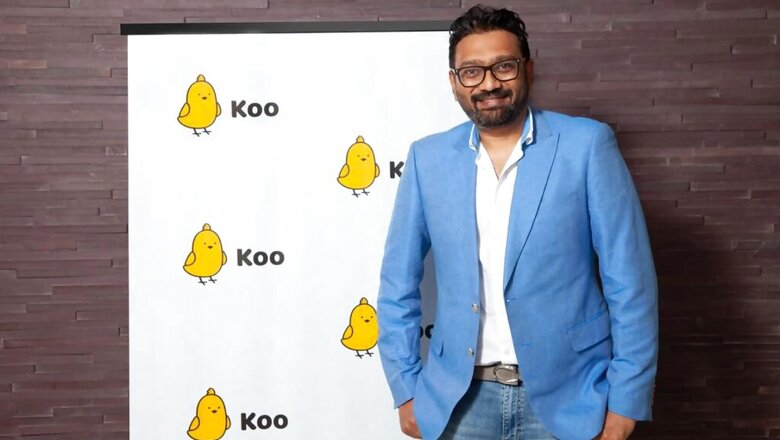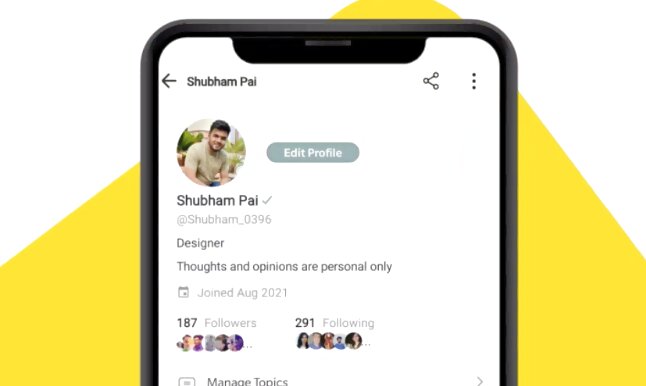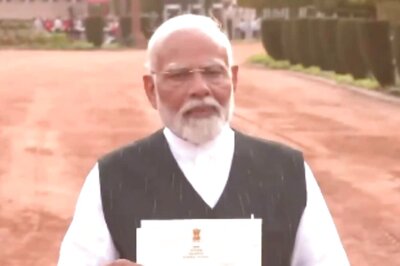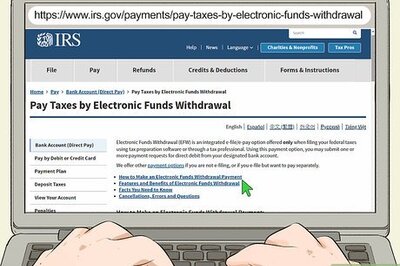
views
Homegrown microblogging platform Koo has become the first significant social media platform in India to introduce Aadhaar verification of its users. Koo is highlighting its ‘Voluntary Self Verification’ feature as a way to distinguish itself from Twitter, Facebook, Instagram and other platforms by giving the option to all users to verify themselves so that they can make real conversation and also to eliminate bots. The idea is simple: verification should not be limited to certain influential users only. The regular user must have the option to highlight that they are real humans and not bots irrespective of the number of followers they have.
Aprameya Radhakrishna, co-founder, Koo in an exclusive interaction with Debashis Sarkar of News 18 Tech shares how Koo is trying to make social media life ‘real’ and make people accountable for what they say. Not just that, Radhakrishna believes that Koo can be India’s ‘TikTok moment’– with reference to how TikTok became big after it ventured out of China.
Here are excerpts from this exclusive interview of Aprameya Radhakrishna, co-founder, Koo with News 18 Tech.
Question: What’s the idea behind rolling out Aadhaar-based self verification?
Aprameya Radhakrishna: I think what has happened with the internet is that everybody somehow thinks that if they cannot misbehave offline then they can misbehave online. This mentality is actually wrong. For example, if you were to stand in front of a group of 20 people and if you said something abusive, there would be repercussions, right? Hence, in the offline setup in front of people, you will always be respectful while communicating. Now, communication online also has to be the same. Just because it is online doesn’t mean you can use abusive words or easily get away with whatever you say.
Just because it is online doesn’t mean you can use abusive words or easily get away with whatever you say.
Question: What is the new ‘Voluntary Self Verification’ feature on Koo?
Aprameya Radhakrishna: We now have two types of user verification on Koo. The yellow tick highlights verified profiles of important people. This is similar to the Blue Tick on Twitter or other platforms. There’s a new green tick feature with which all users on Koo from India can verify themselves as a real person using the profile and not a bot.
The Self Verification feature is available to Koo users who have a Koo account along with an Indian phone number linked to a valid Aadhaar number issued by the UIDAI. If you do not have an Indian phone number linked to a Government-issued Aadhaar Number you will not be able to voluntarily self verify yourself.
The green tick feature on the Koo App will allow all users from India to verify themselves as a real person using Koo and not a bot.

Question: Will this Aadhaar-based self verification process always remain voluntary and do you feel enough users will opt for it?
Aprameya Radhakrishna: The self-verification process will remain voluntary always. Only those users who are interested in communicating for real will opt for it. You will be surprised to know that people are actually demanding this kind feature for a long time. Real human users want to have a clear indicator that their social media accounts are real and not controlled by bots.
The self-verification process will remain voluntary always.
Question: Data privacy is a concern and people may not be comfortable in Aadhaar-verification of their social media profiles. Your views?
Aprameya Radhakrishna: We are not storing any government ID data. The entire Aadhaar-verification is taken care of by third-party and it works similar to other services. We do not store any kind of Aadhaar-card data on our servers.
Question: When an account is verified, there’s always a risk of someone knocking on your door because they did not like what you have posted on social media. Using social media responsibly is an important thing but on the other hand, criticisms may not be appreciated as well. Your views?
Aprameya Radhakrishna: I don’t think the common man, or anybody can just land up at somebody’s door, because of what you said online. It has to be against, you know, the general law of land for somebody to land up at your doorstep. However, there are exceptions. Like, if somebody is talking about pro-terrorism, or somebody’s spreading religious hate which leads to some violence offline so, the it’s a different debate. Otherwise, you know, proper conversations is what freedom of speech is all about. And that is the reason why we’ve started to give inclusive freedom of speech, everybody has to have a voice and not just people who speak English.
I don’t think the common man, or anybody can just land up at somebody’s door, because of what you said online.
Question: Koo is seen as a ‘desi alternative’ to Twitter. What’s interesting is that Twitter itself has just around 1.75 crore users in India, which is barely 1% of India’s population. So, why become a Twitter-alternative in the first place and not try to be like Facebook and Instagram which are used by the majority of smartphone users in India?
Aprameya Radhakrishna: We’re not a desi version of Twitter. We are a global player and we are a platform that wants to localise social media needs according to the norm of each country. And we will take it to the world. I truly believe that Koo can be the TikTok moment for India. TikTok went out of China and captured the world. I think Koo has an opportunity to do that from India.
One of the key philosophies for us is to enable people to express themselves in local languages according to our local culture. We are not an English language-dominated social media platform. And hence, we will not hit a glass ceiling of 1% of India because we are beyond English. If you’re very focused on English, you will only have one 2% of India who wants to express or consume content in English. But, the very fact that we are in multiple languages opens up 99% of India for us. So, the opportunity for self expression in local languages is huge.
I think we are a global company, which is taking localisation to the world. Once we crack the Indian market, any other country with multiple languages would love to have the same solution as Koo. So, that is our plan.
I truly believe that Koo can be the TikTok moment for India. TikTok went out of China and captured the world. I think Koo has an opportunity to do that from India.
Question: What’s your plan to monetise Koo in the long run?
Aprameya Radhakrishna: Our focus is on growth and getting a highly sticky community on the platform right now. So, it’s early to comment on how we will monetize. But broadly, we will do some kind of inclusive advertising and also look at ways of helping the Creator community monetise, which will in-turn help our monetising plans as well.
Read all the Latest Tech News and Breaking News here



















Comments
0 comment